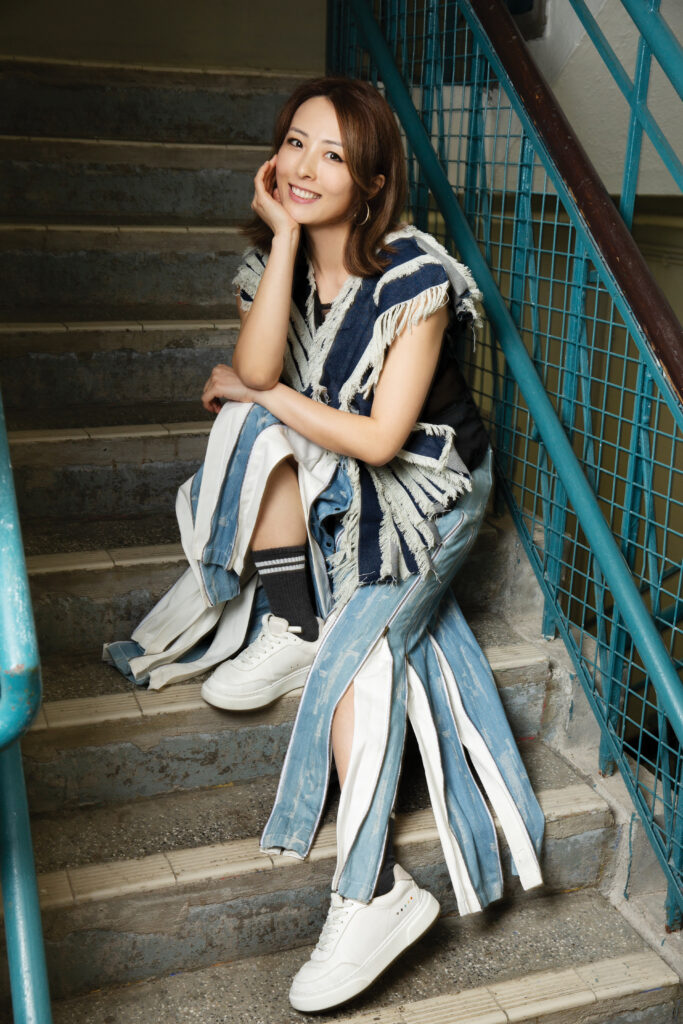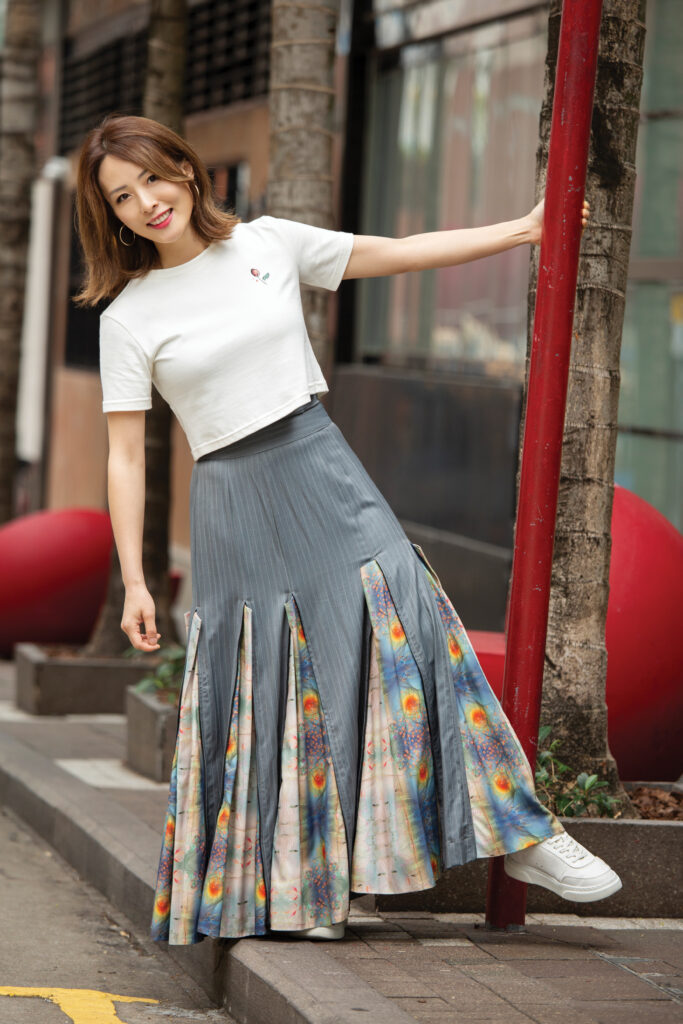In the vibrant city of Hong Kong, where consumerism has long been synonymous with high-rises and luxury malls, one woman is revolutionising the shopping landscape by infusing sustainability into the heart of retail. Natalie Chow, the visionary co- founder of sustainable sneaker-maker KIBO (K!BO in branding parlance), is leading the charge to redefine the shopping experience, placing environmental consciousness at the forefront.
From the get-go, it was important to Chow that her marketing and message did not make consumers feel bad about their shopping and lifestyle choices while offering them a guilt-free planet-friendly alternative. The savvy businesswoman is aware that there are a lot of unexpected implications associated with the food, clothing and accessories we use and own – consequences that affect not just animals but also society and the environment. She is keen to stress that the objective isn’t guilt, even when discussing the appalling circumstances people endure in fast-fashion factories or the catastrophic effects of animal husbandry on the planet.
“I was always drawn to beautiful things and advertising was actually what I really wanted to get into; hence, I started studying marketing,” says the University of Melbourne alumnus. “I did both marketing and psychology, which are extremely correlated. I think the human brain is fascinating, and quite often we make irrational choices, and I wanted to understand how people make choices every day, and what influences them to do so.”
Equal footing
Chow chooses to wear independent brands for our shoot, as a way to support the local creative scene. Arriving back from a 4-hour Singapore-to-Hong Kong flight, she looks fresh and ready to pose in the hallways of PMQ, where fellow start-up projects and businesses reside.
“Was I there for Taylor Swift? I wish!” she exclaims, breaking into laughter. “But no, I was in Singapore for a sneaker convention. The sneaker world is still a man- dominated industry – surprise, surprise! When I started my own business, I realised how big of a gender gap there is out there in other industries, especially in the start-up space.”

While the majority of sneaker firms were started by men, KIBO was conceived, is run, and the products are designed, by women. Men have long controlled the shoe industry, which is reflected in the preponderance of masculine designs and styles. Conversely, KIBO was created with a heavy emphasis on equality, which is understandable given that it is backed by a sizable female community.
Green path
Chow’s journey towards becoming a trailblazer in sustainable fashion is rooted in her early life and background. Born in Hong Kong, she and her two sisters were raised in Australia by their mother, and she developed a deep appreciation for the unique blend of culture, energy and commerce in the city they lived in. She traces her connection with nature back to her childhood, recalling that she separated the household recyclables from the age of seven.
“I believe this is a journey for myself, and for everyone out there too,” she says. “When I started there was no such thing as ESG (environmental, social and governance) and now it’s mandatory for many companies. The framework and the bar have become clearer over the years, so in both the corporate world and schools, there are standards to comply with and a goal to achieve. As for myself, I have learnt the different credentials in material sourcing, GRS (Global Recycled Standard), BSCI (Business Social Compliance Initiative), FSC (Forest Stewardship Council) and so on, and how to make decisions in production.”
Driven by a desire to effect change, Chow dedicated herself to understanding the complexities of sustainability in fashion. She immersed herself in extensive research, exploring alternative materials, ethical production methods and the concept of circular fashion. Through her studies and personal experiences, she realised she had a unique opportunity to create a brand that could challenge the status quo and inspire others to embrace sustainable fashion.
One step at a time
KIBO, meaning hope in Japanese, was founded in 2019 and was officially launched in 2020, with the goal of giving life and waste new hope. ‘Kind to the planet and kind to your feet’ is their promise, as Chow and her team employ materials that would otherwise end up in landfills, such as leather scraps from manufacturers, recovered post-consumer plastic waste, and most recently, imitation leather made from apple waste.

“I was on maternity leave when my husband [KIBO co-founder Simon Chow] and I started to brainstorm. At that time, we noticed there really was a gap as well as an opportunity in the sneakers space and I guess that’s how the seed was planted,” she recalls. Her husband’s family runs a shoe- manufacturing company.
“Moreover, as a mother of two, I wanted to pursue something meaningful and purposeful that my kids would grow up and be proud of. Sustainability has to encompass ethics and transparency, otherwise, it’s quite meaningless. Since we have an edge of having relevant backgrounds in this industry, we decided to take this leap of faith.”
As the introductory lines on the KIBO website spell out, ‘the ! is a reminder to do things differently. The fashion industry needs to change and tackle big issues such as climate change and modern slavery.
And that’s only possible if we adapt ourselves and unite as a community. Because we know that every small step goes a long way.’
Walk the walk
Through her brand’s ethical practices and commitment to transparency, she has successfully challenged the conventional notion that fashion and sustainability are incompatible. But she is far from settling, and will continue to improve.
“Problem-solving has been a skill that I was fortunate to have adopted with my previous work experiences, but being a brand founder has taken it to the next level just because we have problems to solve every single day. From production hiccups to liaising with partners, both soft skills and hard skills are required such as managing my own time and analytical skills,” she says.

By making conscious consumerism accessible and stylish, KIBO has inspired a broader movement towards a more sustainable future for Hong Kong’s retail industry. Its success serves as a testament to the power of idealists to effect meaningful change, reminding us that a person can go into an industry they are passionate about without compromising their beliefs.
As Chow emphasises throughout our conversation, sustainability and style can indeed go hand in hand. But behind it all is a drive to connect with consumers through her shoes. She considers fashion a service industry. When she’s working on a collection, she is thinking about how a KIBO piece should make you feel: confident, comfortable, alive and effortless.
“It’s timely that this is for the April issue,” she says, her eyes lighting up. “Earth Month; let’s do it right!”
Interview, Text and Art Direction by: Joseff Musa Photographer: Jack Law Videographer: Jack Fontanilla Brands: KiBO and Vincent Li Studio



